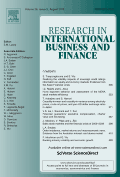
Research in International Business and Finance
Scope & Guideline
Championing empirical research for international excellence.
Introduction
Aims and Scopes
- International Financial Markets and Risk Management:
The journal explores the dynamics of international financial markets, focusing on risk management strategies, price volatility, and the impact of global economic events on financial stability. - Sustainable Finance and ESG Integration:
Research on sustainable finance practices, including the integration of Environmental, Social, and Governance (ESG) criteria into investment decisions, is a core focus area, reflecting the growing importance of sustainability in finance. - Digital Transformation and FinTech Innovations:
The journal highlights the role of digital transformation and FinTech innovations in reshaping financial services, including the use of blockchain, cryptocurrencies, and digital currencies. - Corporate Finance and Governance:
Studies on corporate governance, ownership structures, and their influence on firm performance and risk-taking behavior are prevalent, providing insights into effective management practices. - Emerging Markets and Globalization:
Research addressing the challenges and opportunities in emerging markets, including cross-border investments, trade policies, and the impact of globalization on local economies. - Behavioral Finance and Investor Psychology:
The journal also examines behavioral finance, focusing on how psychological factors influence investor decisions and market outcomes.
Trending and Emerging
- Impact of COVID-19 on Financial Markets:
Research focusing on the implications of the COVID-19 pandemic for financial markets, investor behavior, and corporate governance has surged, reflecting the need to understand market resilience in crises. - Cryptocurrencies and Blockchain Technology:
There is a growing trend in research related to cryptocurrencies, blockchain technology, and their implications for traditional financial systems, indicating a shift towards digital assets. - Sustainable Investment Practices:
An increasing focus on sustainable investment practices and the role of green finance in promoting economic growth and environmental responsibility is evident in recent publications. - Behavioral Insights in Finance:
Emerging research on behavioral finance, particularly how cognitive biases and investor sentiment affect market dynamics, is gaining traction. - Data Analytics and Machine Learning in Finance:
The application of data analytics and machine learning techniques to financial modeling and risk assessment is a rapidly growing area, reflecting the technological advancement in the field.
Declining or Waning
- Traditional Banking Models:
Research on conventional banking practices and models has decreased as the focus shifts toward innovative financial technologies and digital banking solutions. - Static Risk Assessment Models:
There is a waning interest in static models of risk assessment, as researchers increasingly adopt dynamic and machine learning approaches that better capture the complexities of modern financial markets. - Local Market Studies:
The emphasis on localized market studies has diminished, with a growing preference for research that addresses global financial interconnectivity and international comparisons. - Corporate Social Responsibility (CSR) without Financial Metrics:
The exploration of CSR initiatives without linking them to financial performance has declined, as more research seeks to establish measurable impacts of CSR on firm value. - Historical Financial Analysis:
Interest in historical financial analysis as a standalone topic is waning, giving way to more contemporary issues related to current market behaviors and trends.
Similar Journals

Financial Innovation
Leading the Charge in Financial and Technological AdvancementsFinancial Innovation, published by Springer, is a premier open access journal that has been contributing to the fields of finance and management of technology and innovation since its inception in 2015. With an impressive Q1 category ranking in both Finance and Management of Technology and Innovation, the journal places itself at the forefront of academic research, reflected in its Scopus rankings—#17 out of 317 in Finance (94th percentile) and #29 out of 289 in Management of Technology and Innovation (90th percentile). Centered in Germany, this journal aims to disseminate high-quality research that fosters theoretical and practical advancements within its scope, encouraging exchanges between academia and industry. The open access model enhances visibility and accessibility of published research, thus playing a critical role in shaping the future of financial practices and technology management. For researchers, professionals, and students alike, Financial Innovation remains essential for staying abreast of cutting-edge developments and trends in these dynamic fields.
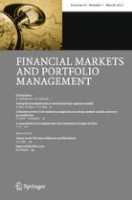
Financial Markets and Portfolio Management
Pioneering Research at the Intersection of Finance and Economics.Financial Markets and Portfolio Management is a renowned peer-reviewed journal published by Springer, focusing on the dynamic and evolving intersections of finance, economics, and accounting. With an ISSN of 1934-4554 and an e-ISSN of 2373-8529, the journal provides a platform for innovative research on financial markets, investment strategies, and portfolio management techniques. It boasts an impactful presence in the academic community, with a Scopus ranking placing it in the 58th percentile in Finance and the 51st percentile in Accounting, underscoring its significance in both fields. Spanning coverage from 2006 to 2024, the journal offers essential insights for researchers, practitioners, and students interested in the latest developments and empirical analyses in financial practices. Although it does not offer open access options, its rigorous editorial standards ensure high-quality content accessible to library and institutional resources. The journal plays a pivotal role in advancing knowledge and fostering dialogue in an increasingly complex financial landscape.
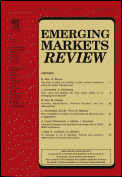
Emerging Markets Review
Shaping Insights for Tomorrow's EconomiesEmerging Markets Review, published by Elsevier, stands as a leading platform for scholarly discourse in the fields of Business, International Management, and Economics. With a strong focus on the dynamic and evolving landscapes of emerging markets, this journal boasts an impressive impact factor, reflecting its high-quality research and significant contribution to the academic community. Covering a wide array of topics pertinent to emerging economies, the journal is dedicated to disseminating cutting-edge research findings, theoretical advancements, and practical insights that are essential for both researchers and industry professionals. Operating since 2000, and with its converged years extending to 2024, Emerging Markets Review has secured a Q1 category ranking in both its primary domains (Business and International Management; Economics and Econometrics), underscoring its critical role in shaping knowledge and practices in these fields. The journal's esteemed reputation is further highlighted by its strong Scopus rankings, placing it among the top percentile for relevant subject areas. Although it is not an Open Access journal, it remains accessible through institutional subscriptions, ensuring that the wealth of knowledge contained within its pages reaches a broad audience.

EMERGING MARKETS FINANCE AND TRADE
Driving Research on Trade Trends and Economic PoliciesEmerging Markets Finance and Trade is a leading academic journal published by Routledge Journals, Taylor & Francis Ltd, specializing in the dynamic field of finance and trade within emerging markets. This journal boasts an impressive impact factor and ranks in the top quartiles of its categories, attaining Q1 status in Economics, Econometrics and Finance (miscellaneous) and Q2 in Finance as of 2023. With a strong focus on innovative research, it publishes cutting-edge studies and insights that are crucial for understanding the complexities of financial systems in emerging economies. The journal, with ISSN numbers 1540-496X and 1558-0938 for its electronic version, offers a platform for both established researchers and newcomers in the field, highlighting the latest trends, policies, and challenges in finance and trade from 2002 to 2024. While it maintains a subscription-based access model, its significant contributions make it a must-read for academics, professionals, and students alike who seek to navigate and influence the rapidly evolving landscape of emerging markets.
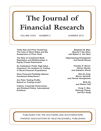
JOURNAL OF FINANCIAL RESEARCH
Charting New Territories in Financial InquiryThe JOURNAL OF FINANCIAL RESEARCH, published by WILEY, stands as a pivotal platform for disseminating innovative research in the fields of finance and accounting since its inception in 1978. With an ISSN of 0270-2592 and an E-ISSN of 1475-6803, this journal aims to address contemporary challenges and trends within the financial research landscape. It has achieved notable recognition, being placed in the Q2 category for both Finance and Accounting in the 2023 rankings, signifying its relevance and impact within the academic community. Although it does not currently offer open access, the journal is accessible through various academic databases, catering to a diverse audience of researchers, professionals, and students keen on advancing their knowledge and understanding of financial systems and methodologies. With an evolving scope that encompasses empirical studies, theoretical frameworks, and practical applications, the JOURNAL OF FINANCIAL RESEARCH is committed to contributing valuable insights into the complexities of financial practices and policies.

European Journal of Finance
Advancing financial knowledge across Europe.European Journal of Finance is a prestigious publication specializing in the domains of finance, economics, and econometrics, published by Routledge Journals, Taylor & Francis Ltd. Established in 1995, this journal has become a vital resource for researchers, practitioners, and students, contributing significantly to the understanding of financial systems and markets. With its Q1 ranking in the Economics, Econometrics and Finance category, it stands out for its rigorous peer-reviewed articles that explore innovative theories, models, and empirical studies. The journal's impressive Scopus ranking of 35 out of 242 highlights its impact and relevance within the field, with an 85th percentile standing that underscores its importance to current financial research. Although it does not offer open access, the European Journal of Finance remains a cornerstone for those seeking to delve deeper into the complexities of finance, equipped with insights that drive both academic inquiry and practical application.
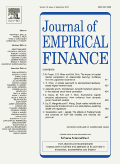
Journal of Empirical Finance
Connecting theory and practice in empirical finance.Journal of Empirical Finance, published by Elsevier, stands as a key resource in the areas of finance and economics, with a definitive focus on empirical studies. As a prominent journal since its inception in 1993, it has made significant strides in contributing to the academic community, evidenced by its soaring categorization in Q1 for Finance and Q2 for Economics and Econometrics as of 2023. With an ISSN of 0927-5398 and an E-ISSN of 1879-1727, the journal emphasizes robust, data-driven analysis to inform both theoretical and practical aspects of financial research. While access options do not include open access, the journal ensures that its content remains accessible to a diverse audience of researchers, professionals, and students. It fosters a platform for innovative research and discourse, significantly impacting the fields of finance, economics, and econometrics. The Scopus rankings further bolster its reputation, placing it in the 61st percentile in both categories, reflecting a commitment to high-quality research output. As the journal continues to evolve, it invites contributions that push the boundaries of empirical finance, enabling a deeper understanding of financial mechanisms that drive global economies.
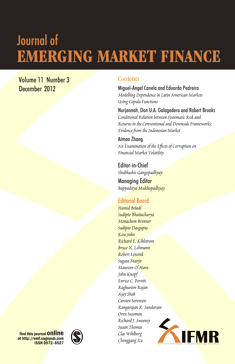
Journal of Emerging Market Finance
Illuminating the Future of Emerging Market EconomiesThe Journal of Emerging Market Finance, published by SAGE Publications India Pvt Ltd, is a premier academic journal that serves as a vital resource for researchers, professionals, and students in the fields of finance and economics. Established in 2002, this journal focuses on the multifaceted dynamics of emerging market economies and their financial systems. With an ISSN of 0972-6527 and an E-ISSN of 0973-0710, it has garnered attention with its respectable Q3 rankings in both the Economics and Econometrics and Finance categories, reflecting its commitment to high-quality research. Despite its limited open-access options, the journal remains a significant platform for scholarly discussions, providing insights on emerging financial instruments, market behaviors, and economic policies in developing economies. As a continuously evolving publication, it aims to bridge the gap between theory and practice, promoting an understanding of the complexities faced in these vibrant markets, ultimately serving the academic community with relevant and impactful research until 2024 and beyond.

Pacific-Basin Finance Journal
Empowering Researchers with Cutting-Edge Finance InsightsPacific-Basin Finance Journal is a prestigious academic journal that focuses on critical developments and innovative research within the fields of finance and economics, specifically tailored to the Pacific region's unique economic landscape. Published by Elsevier, the journal boasts an impressive impact factor and is categorized in the Q1 quartile for both Economics and Econometrics and Finance as of 2023. This indicates its high relevance and position among the top journals in its field, with Scopus rankings reflecting a strong standing in the competitive landscape of finance research, holding the 45th position out of 317 in Finance and the 108th in Econometrics. Established in 1993, the journal is committed to disseminating rigorous theoretical and empirical research findings that enhance the understanding of financial systems in the Pacific Basin. Although the journal is not open access, it provides invaluable insights and comprehensive studies aimed at professionals, researchers, and students alike, fostering a deeper comprehension of the region's economic dynamics and global interconnectedness.
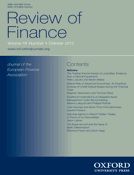
Review of Finance
Driving innovation in financial research and practice.The Review of Finance, published by Oxford University Press, stands as a premier academic journal in the fields of Finance, Accounting, and Economics. With an ISSN of 1572-3097 and an impressive track record stretching from 2001 to 2024, this journal is consistently recognized for its high-quality research, reflected in its Q1 rankings across key categories, including Accounting, Finance, and Economics and Econometrics. The Review of Finance is dedicated to advancing the understanding of financial phenomena through robust empirical and theoretical insights, making it an essential resource for researchers and professionals alike. Additionally, its strong Scopus rankings, placing it in the top percentiles, highlight its influence and relevance in ongoing academic discourse. Although the journal is not open access, it remains widely accessible through academic institutions, ensuring that its valuable contributions reach an extensive audience. The editorial board invites submissions that promise to further engage the academic community in the dynamic intersections of finance, accounting, and economic research.